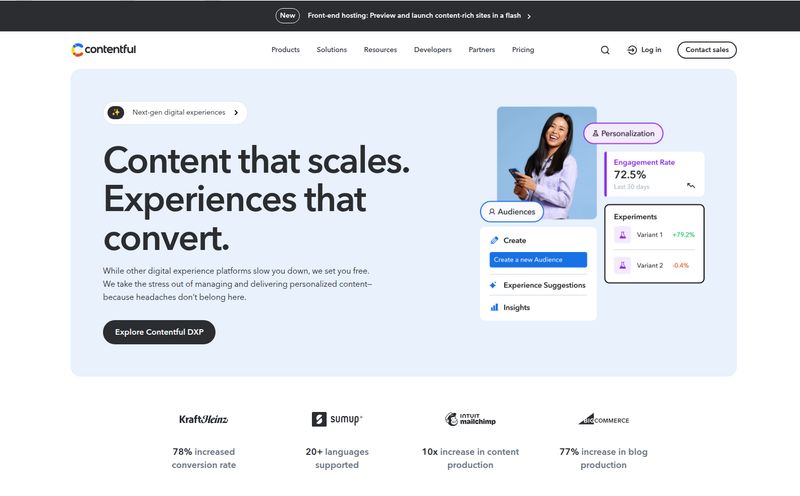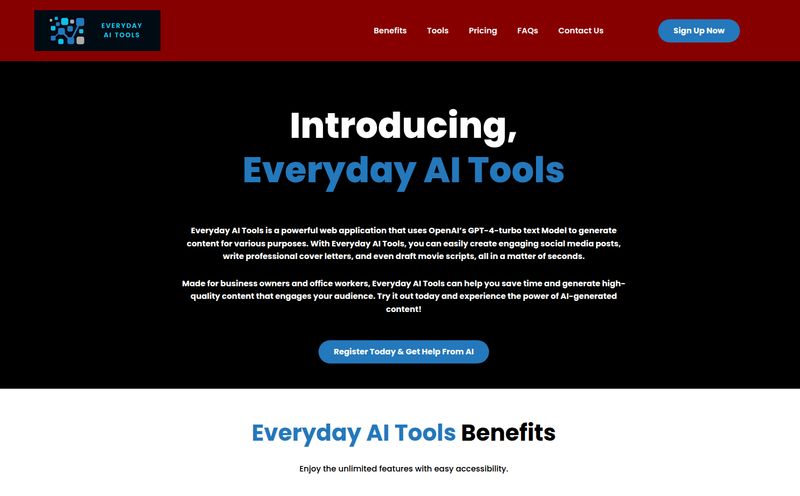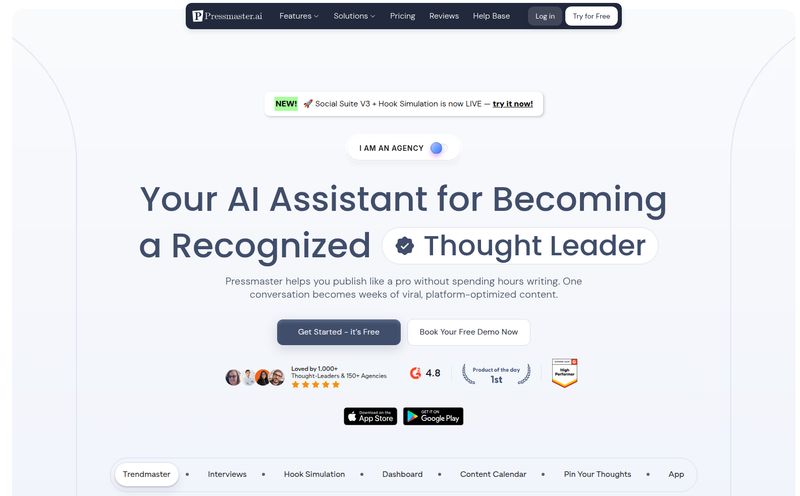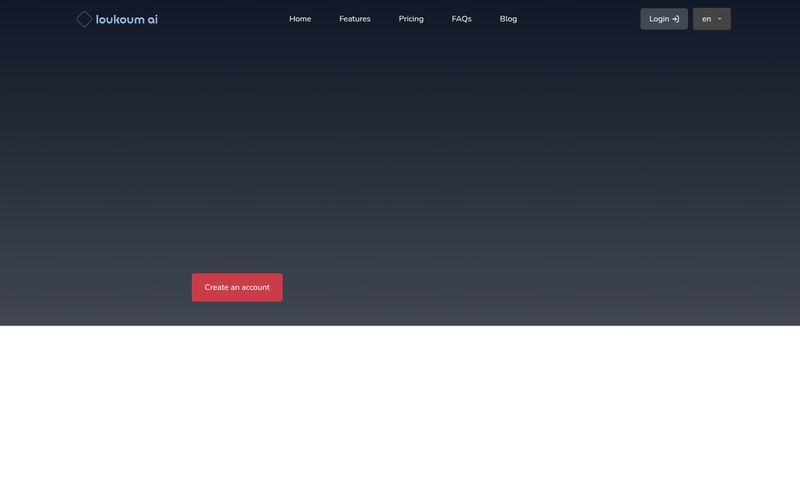As someone who lives and breathes SEO and digital trends, my inbox is a constant flood of pitches for the "next big thing." Every day, it's a new AI-powered this or a game-changing that. Honestly, most of it is just noise. Re-skinned ChatGPT wrappers or tools that promise the world but deliver a tiny, glitchy island. But every now and then, a name pops up that makes you lean in a little closer. MossAI was one of those.
The description I saw was clean, confident, and hit all the right notes. A "revolutionary AI chatbot," they said. User-friendly. Cross-platform. It sounded like a solid contender, ready to carve out its own space in an increasingly crowded arena. So, naturally, I did what any digital-native would do. I opened a new tab and typed in the address, ready to take it for a spin.
And that’s where our story takes a weird turn.
What Was MossAI Supposed to Be?
On paper, MossAI looked like a dream for anyone who juggles multiple devices and needs a reliable AI assistant. The feature list wasn't bloated with jargon; it was a simple, powerful promise of what a good chatbot should be. It felt like the creators actually understood the daily frustrations of users, not just the technical possibilities.
They were touting the latest AI chat technology, which, while a bit vague, at least signaled they were aiming for the top. But the real magic was in the practical, user-focused features they highlighted.
A Truly Cross-Platform Experience
This was the first thing that grabbed me. MossAI was designed to work across iPhone, iPad, and the web. That might not sound like a huge deal, but think about it. How many times have you started a conversation on your laptop only to need that same information on your phone while you're out, and the app just doesn't sync? It’s a small friction point that turns into a massive annoyance over time. MossAI promised to solve that. One continuous conversation, no matter where you were. That's the holy grail for productivity nerds like me.
Unlimited and Unforgettable Conversations
Another big tick in the 'pro' column was the promise of unlimited questions and answers and a full, saved chat history. In the early days of these tools, you'd often hit a daily limit right when you were in the middle of a creative flow. So frustrating. And the 'memory' part is huge. An AI that remembers what you talked about yesterday, or even last week, feels less like a tool and more like a real assistant. It stops being a search engine and starts being a partner. This feature alone would have put it ahead of many competitors who seem to have the short-term memory of a goldfish.
Breaking Language Barriers
They also boasted multi-language support. In our globalized world, this isn’t just a nice-to-have; it's a necessity. Being able to communicate and get help in your native tongue is a fundamental part of making technology accessible and truly user-friendly. It showed a broader vision, which I always appreciate.
So, Where Did It Go? The Domain Dilemma
So there I was, hyped up about this slick, thoughtful new tool. I navigate to Mossai.site, and what do I find? Not a login screen. Not a fancy landing page. I found this:

Visit MossAI
A GoDaddy landing page. "This domain is available for sale!"
My heart sank a little. It's the digital equivalent of showing up to a grand opening and finding a "For Lease" sign in the window. It’s a dead end. This wasn't a 404 error or a server-down message; this was a sign that the entire project might be... well, gone. A digital ghost.
In my experience, this happens for a few reasons. A startup runs out of cash, the founders have a falling out, or maybe the project was just an idea that never quite got off the ground. Whatever the reason, the dream of MossAI appears to be on ice, and its digital real estate is up for grabs via Afternic, GoDaddy's domain marketplace.
The Volatile World of AI Startups
The story of MossAI, or the lack thereof, is a perfect snapshot of the current AI gold rush. Everyone is racing to build the next killer app, but it's an incredibly expensive and competitive game. It’s like building a beautiful F1 car but realizing you don't have the budget for fuel, tires, or a pit crew.
The very technology that makes these chatbots powerful—the large language models—comes with significant costs. API calls to providers like OpenAI aren't free, and hosting your own models is even more resource-intensive. A lot of startups enter the market with a great product but a weak business plan, hoping to figure out monetization later. Sometime's that works. Often, it doesn't.
The digital graveyard is filled with promising tools that burned bright and fast. It's a tough environment, and for every runaway success, there are dozens of MossAIs—great ideas that, for one reason or another, flicker out before they ever truly catch fire.
What We Can Learn from This Story
This little investigation is more than just a eulogy for a tool that never was. It's a reminder for anyone in the tech space. First, secure your brand! Your domain name is your digital storefront; letting it lapse is like handing the keys to a stranger. Second, a great idea is only half the battle. You need a sustainable plan to back it up, especially in a capital-intensive field like AI. And finally, for us users, it's a reminder to be discerning. The shiniest new tool isn't always the one that will be around tomorrow.
I’m still a bit bummed. MossAI sounded genuinely useful. Maybe someone will buy the domain and revive the project, or maybe the original founders will pop up with a new brand. Who knows? In the fast-moving world of tech, anything is possible.
Frequently Asked Questions about MossAI
- What was MossAI?
- MossAI was described as a user-friendly, cross-platform AI chatbot designed to work on iPhones, iPads, and the web. Its key features included unlimited Q&A, multi-language support, and the ability to remember your entire chat history.
- Why can't I access the Mossai.site?
- Currently, the domain name `Mossai.site` is listed for sale on GoDaddy and its partner Afternic. This indicates that the original project is likely inactive, abandoned, or was never fully launched.
- What were the best features of MossAI?
- Based on its promotional info, the standout features were its seamless cross-platform syncing, the promise of unlimited use without hitting caps, and its long-term memory for more coherent, ongoing conversations.
- Are there good alternatives to MossAI?
- Absolutely. While MossAI itself isn't available, you can get a similar experience from established players. ChatGPT (from OpenAI), Gemini (from Google), and Claude (from Anthropic) are all powerful AI chatbots with many of the features MossAI promised.
- How much did MossAI cost?
- There is no available pricing information for MossAI. It's possible the project was discontinued before a pricing structure was ever finalized or made public.
- Is it possible for MossAI to come back?
- It's unlikely in its original form, but not impossible. Someone could purchase the domain and launch a new tool under the same name, or the original developers could regroup under a new brand. In tech, you never say never.
A Final Thought
The curious case of MossAI is a classic tech tale. Full of promise, great ideas, and an ending that leaves you wondering what could have been. It's a stark reminder that in the world of SEO, traffic, and tech, an online presence is everything. Here today, for sale on GoDaddy tomorrow. For now, we'll just have to stick with the chatbots that remembered to renew their domains.
Reference and Sources
- Domain Sale Listing: GoDaddy / Afternic
- General AI Startup Costs discussion (example): TechCrunch - The true cost of an AI startup



